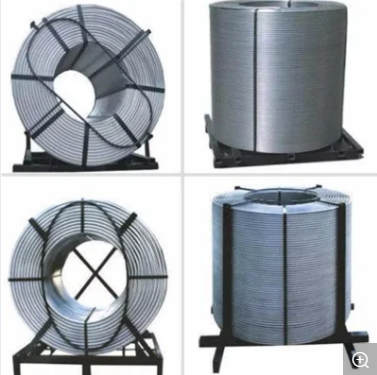
Alloying is a fundamental process in steel production that involves the addition of specific elements to enhance the steel's properties and performance. Calcium Cored Wire (CCW) has emerged as a valuable tool for alloying in the steelmaking industry. This article explores the process of steel alloying with Calcium Cored Wire and its significant impact on steel performance.
Calcium Cored Wire is a composite material consisting of a steel casing filled with a powdered blend of calcium and other alloying elements. It is designed to introduce precise amounts of alloying elements into the molten steel during the steelmaking process. The addition of Calcium Cored Wire enables controlled and efficient alloying, allowing manufacturers to tailor the steel's characteristics to meet specific requirements.
Improved Strength and Durability: Alloying with Calcium Cored Wire enables the introduction of elements such as manganese, chromium, and vanadium into the steel. These alloying elements enhance the steel's strength, hardness, and resistance to wear and fatigue, resulting in improved durability and longevity of the final steel product.
Enhanced Corrosion Resistance: Calcium Cored Wire allows for the introduction of alloying elements like nickel, copper, and molybdenum, which improve the steel's corrosion resistance. This is particularly important in applications where the steel is exposed to harsh environments, such as marine or chemical industries.
Tailored Mechanical Properties: Alloying with Calcium Cored Wire enables precise control over the steel's mechanical properties. By incorporating elements such as boron, titanium, or niobium, manufacturers can achieve specific characteristics, such as improved formability, weldability, or heat resistance, to meet diverse application requirements.
Customized Microstructure: Calcium Cored Wire facilitates the refinement of the steel's microstructure. The addition of alloying elements influences the grain size, distribution of phases, and overall homogeneity of the steel, leading to enhanced mechanical and metallurgical properties.
Cost Optimization: Alloying with Calcium Cored Wire provides cost optimization opportunities in steel production. By precisely introducing the required alloying elements, manufacturers can minimize material waste and achieve the desired properties with greater efficiency, resulting in cost savings.

Automotive Industry: Alloying with Calcium Cored Wire is widely utilized in the automotive industry to produce high-strength steels for components such as chassis, body structures, and engine parts. The tailored properties achieved through alloying enable lightweight design, improved fuel efficiency, and enhanced crashworthiness.
Construction and Infrastructure: Alloying with Calcium Cored Wire is essential in producing structural steels used in buildings, bridges, and other infrastructure projects. The alloying elements contribute to the steel's strength, toughness, and resistance to seismic activity, ensuring structural integrity and safety.
Energy Sector: Alloying with Calcium Cored Wire plays a vital role in the energy sector, specifically in the production of steels for pipelines, power generation equipment, and offshore structures. The alloying elements enhance the steel's resistance to high temperatures, pressure, and corrosive environments, ensuring reliable and durable performance.
Tool and Die Manufacturing: Alloying with Calcium Cored Wire is crucial in the production of tool steels used in manufacturing processes such as forging, stamping, and cutting. The alloying elements improve hardness, wear resistance, and heat resistance, extending tool life and optimizing production efficiency.

Write a Message